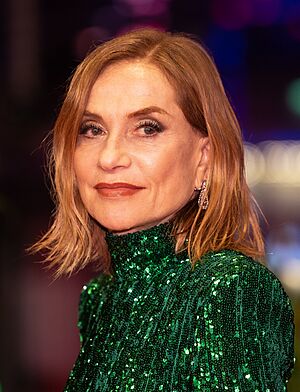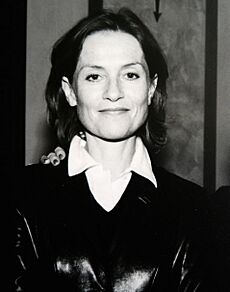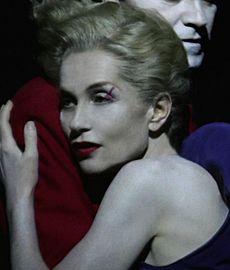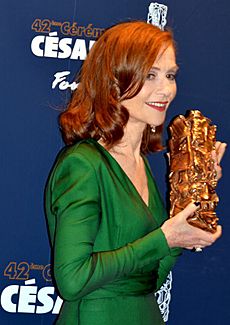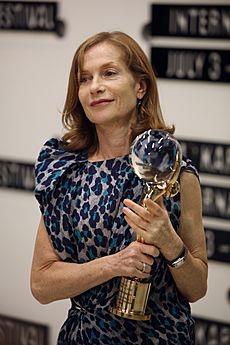Isabelle Huppert facts for kids
Isabelle Huppert (born 16 March 1953) is a famous French actress. She is known for playing strong and interesting characters. Many people think she is one of the best actresses of her time.
Isabelle Huppert has been nominated for the César Awards 16 times, which is more than any other actress. She has won two César Awards. She has also won many other awards, including five Lumière Awards, a BAFTA Award, three European Film Awards, and awards from the Berlin International Film Festival, Cannes Film Festival, and Venice Film Festival. She also won a Golden Globe Award and was nominated for an Academy Award. In 2020, The New York Times listed her as the second greatest actor of the 21st century.
Huppert first received a César Award nomination for Aloïse (1975). She won the Best Actress César for La Cérémonie (1995) and Elle (2016). For The Lacemaker (1977), she won a BAFTA Award for being a promising new actress. She also won two Cannes Film Festival Awards for Best Actress for Violette Nozière (1978) and The Piano Teacher (2001). She won the Volpi Cup for Best Actress twice for Story of Women (1988) and La Cérémonie. Some of her other well-known French films include Loulou (1980), La Séparation (1994), 8 Women (2002), Gabrielle (2005), Amour (2012), Things to Come (2016), and Happy End (2017).
For her role in Elle, Huppert was nominated for an Academy Award for Best Actress. She also won a Golden Globe Award and an Independent Spirit Award. Isabelle Huppert has worked in many international films. Her English-language films include Heaven's Gate (1980), The Bedroom Window (1987), I Heart Huckabees (2004), The Disappearance of Eleanor Rigby (2013), Louder Than Bombs (2015), Greta (2018), Frankie (2019), and Mrs. Harris Goes to Paris (2022).
Isabelle Huppert is also a very active stage actress. She has been nominated nine times for the Molière Award for Best Actress, which is a record. She received an honorary award in 2017. In the same year, she won the Europe Theatre Prize. She first performed on the London stage in Mary Stuart in 1996. Her New York stage debut was in 4.48 Psychosis in 2005. More recently, she has performed in Quartett (2009) in New York, The Maids (2014) with the Sydney Theater Company, and The Mother (2019) in New York City.
Contents
Early Life and Education
Isabelle Huppert was born in Paris, France, on 16 March 1953. Her mother, Annick, was an English teacher, and her father, Raymond, made safes. Isabelle is the youngest of five children. One of her sisters, Caroline Huppert, is a filmmaker. She grew up in a town called Ville-d'Avray. Her father's family was Jewish, and her mother's family was Catholic. Isabelle was raised in her mother's Catholic faith.
When she was 15, in 1968, Huppert started studying acting at the Conservatoire à rayonnement régional de Versailles. She won an award there for her acting. She also studied at the Conservatoire national supérieur d'art dramatique (CNSAD).
Career Highlights
1970s: Starting Out and First Successes
Isabelle Huppert first appeared on television in 1971 in Le Prussien. Her first movie role was in the romantic comedy Faustine et le Bel Été (1972). This film was shown at the 1972 Cannes Film Festival. That same year, she also acted in The Bar at the Crossing and César and Rosalie. She made her theater debut in Paris in Les Précieuses ridicules from 1971 to 1972.
In 1974, she acted in Successive Slidings of Pleasure and L'Ampélopède. She became more widely known for her role as Jacqueline in the comedy Les Valseuses (1974). In this film, she acted alongside Gérard Depardieu and Jeanne Moreau.
The next year, she was in The Common Man (1975), which won an award at the Berlin International Film Festival. She also starred in the American action thriller Rosebud (1975), directed by Otto Preminger, with Peter O'Toole. She played the main character in Aloïse, which was shown at the Cannes Film Festival. In 1976, she acted in The Judge and the Assassin and I Am Pierre Riviere.
Her big international breakthrough came with her role in La Dentelliere (1977). For this film, she won a BAFTA Award for being a promising new actress. Critic Roger Ebert praised her performance, saying she was good at showing a character's hidden feelings. The next year, she won the Cannes Film Festival Award for Best Actress for her role in Violette Nozière (1978). This was the first of seven movies she made with director Claude Chabrol.
1980s and 1990s: Becoming a Star
After not appearing in American films for five years, Huppert starred in Michael Cimino's Heaven's Gate (1980). This film did not do well at first, but later critics saw it as a masterpiece. In the same year, she reunited with Gérard Depardieu in Loulou (1980). She also acted in Jean-Luc Godard's Sauve qui peut (la vie) (1980).
Throughout the 1980s, Huppert continued to play interesting and sometimes mysterious characters. One notable role was in Coup de Torchon (1983), which earned her a César Award for Best Actress nomination. She also acted in the thriller The Bedroom Window (1987). She received praise for her role in Claude Chabrol's Une Affaire de Femmes (1988).
In 1994, Huppert worked with American director Hal Hartley on Amateur. She was praised for her role in La Séparation (1994), where she showed the pain of a relationship ending. She played a strong character in Claude Chabrol's La Cérémonie (1995), for which she won the César Award for Best Actress and the Volpi Cup for Best Actress. Huppert continued working with Chabrol in Rien ne va plus (1997) and Merci pour le Chocolat (2000).
2000s: The Piano Teacher and More Awards
Isabelle Huppert first worked with Austrian director Michael Haneke on The Piano Teacher (2001). Her performance in this film was highly praised and won her the Best Actress Award at Cannes in 2001.
In 2002, she acted in the musical film 8 Women, directed by François Ozon. Critics noted how she stood out in every scene. She also starred in I Heart Huckabees (2004) with Dustin Hoffman.
Huppert has worked with directors from many different countries, including Italy, Russia, Central Europe, and Asia.
She is also a very respected stage actress. She has received seven Molière Award nominations. These include roles in Medea (2001) and Ibsen's Hedda Gabler (2005). Later in 2005, she toured the United States with a French production of 4.48 Psychosis. Huppert returned to the New York stage in 2009 for Quartett. In 2009, she also starred in the film White Material.
Huppert was the head of the jury at the 2009 Cannes Film Festival. She had been a jury member and host in previous years, and had won the Best Actress Award twice. As president in 2009, she and her jury gave the main award, the Palme d'Or, to The White Ribbon by Michael Haneke, who also directed her in The Piano Teacher.
2010s: More Theater and Elle
In 2010, Huppert appeared in the TV show Law & Order: Special Victims Unit. She was also cast in the film Captive (2012) by Filipino director Brillante Mendoza.
In 2012, she starred in two films that competed for the Palme d'Or at the 2012 Cannes Film Festival: Michael Haneke's Amour and Hong Sang-soo's In Another Country. Amour won the top prize. In 2013, she co-starred in The Maids by Jean Genet with Cate Blanchett. This play toured in New York in 2014. She continued acting in films like The Disappearance of Eleanor Rigby (2013), Macadam Stories (2015), and Louder Than Bombs (2015).
In 2016, she starred in two highly praised films: Mia Hansen-Løve's Things to Come and Paul Verhoeven's Elle. For her performance in Elle, Huppert won many awards, including the Golden Globe Award and the César Award for Best Actress. She was also nominated for an Academy Award for Best Actress.
In 2016, Huppert starred in the stage production of Phèdre(s), which toured Europe and New York. In 2017, she received the Europe Theatre Prize. In 2019, she played the main role in Florian Zeller's play The Mother in New York. During this time, she also acted in films like Happy End (2017), Greta (2018), and Frankie (2019).
2020s: Recent Work
Isabelle Huppert's recent films include Jerzy Skolimowski's EO and Anthony Fabian's Mrs. Harris Goes to Paris (both released in 2022). She also starred in The Sitting Duck, which came out in theaters in 2023. In 2024, she starred in A Traveler's Needs, which won an award at the 2024 Berlin Film Festival.
On stage, Huppert has starred in The Glass Menagerie (2022) and The Cherry Orchard (2023). Both roles earned her nominations for Best Actress at the Molière Awards. Her other recent stage work includes Bérénice (2024) and Mary Said What She Said (2019-), which has toured in Europe.
Huppert is also a global ambassador for the fashion brand Balenciaga. In 2024, she was the head of the jury for the main competition at the 81st Venice Film Festival.
Personal Life
Isabelle Huppert has been in a relationship with French writer and director Ronald Chammah since about 1982. She has three children with him, including actress Lolita Chammah. Isabelle and Lolita have acted together in five films, such as Copacabana (2010) and Barrage (2017).
Huppert owns two movie theaters in Paris, the Christine Cinéma Club and Ecoles Cinéma Club. Her son Lorenzo helps manage them.
Awards and Recognition
Isabelle Huppert has been nominated 16 times for the César Award, making her the most nominated actress in its history. She won Best Actress twice: in 1996 for La Cérémonie (1995) and in 2017 for Elle (2016). She is one of only four women to have won Best Actress twice at the Cannes Film Festival: in 1978 for Violette Nozière and in 2001 for The Piano Teacher.
She is also one of only four women to have won the Volpi Cup for Best Actress twice at the Venice Film Festival: in 1988 for Une affaire de femmes and in 1995 for La Cérémonie. Both of these films were directed by Claude Chabrol. In 2005, she received a Special Lion award for her role in Gabrielle. Huppert was voted Best Actress twice at the European Film Awards: in 2001 for The Piano Teacher and in 2002 with the entire cast of 8 Women. The cast of 8 Women also won an award at the 2002 Berlin International Film Festival. Huppert won the Golden Globe Award for Best Actress in a Motion Picture – Drama and was nominated for her first Academy Award for Best Actress for her work in Elle.
In 2008, she received the Stanislavsky Award for her amazing acting achievements. She has also received high honors from the French government, being made a Chevalier (Knight) and then an Officier (Officer) of the Ordre national du Mérite and the Légion d'honneur. In 2022, she received the Honorary Golden Bear Lifetime Achievement Award at the 72nd Berlin International Film Festival.
Europe Theatre Prize
On 17 December 2017, Isabelle Huppert received the XVI Europe Theatre Prize in Rome. The award organization praised her for her amazing work in both movies and theater. They said she always chooses her roles and directors carefully and leaves a strong mark on every project. They also noted her deep love for theater, which she continues to practice with passion and skill.
See also
 In Spanish: Isabelle Huppert para niños
In Spanish: Isabelle Huppert para niños
- List of actors nominated for Academy Awards for foreign language performances
- List of French Academy Award winners and nominees
 | Georgia Louise Harris Brown |
 | Julian Abele |
 | Norma Merrick Sklarek |
 | William Sidney Pittman |


